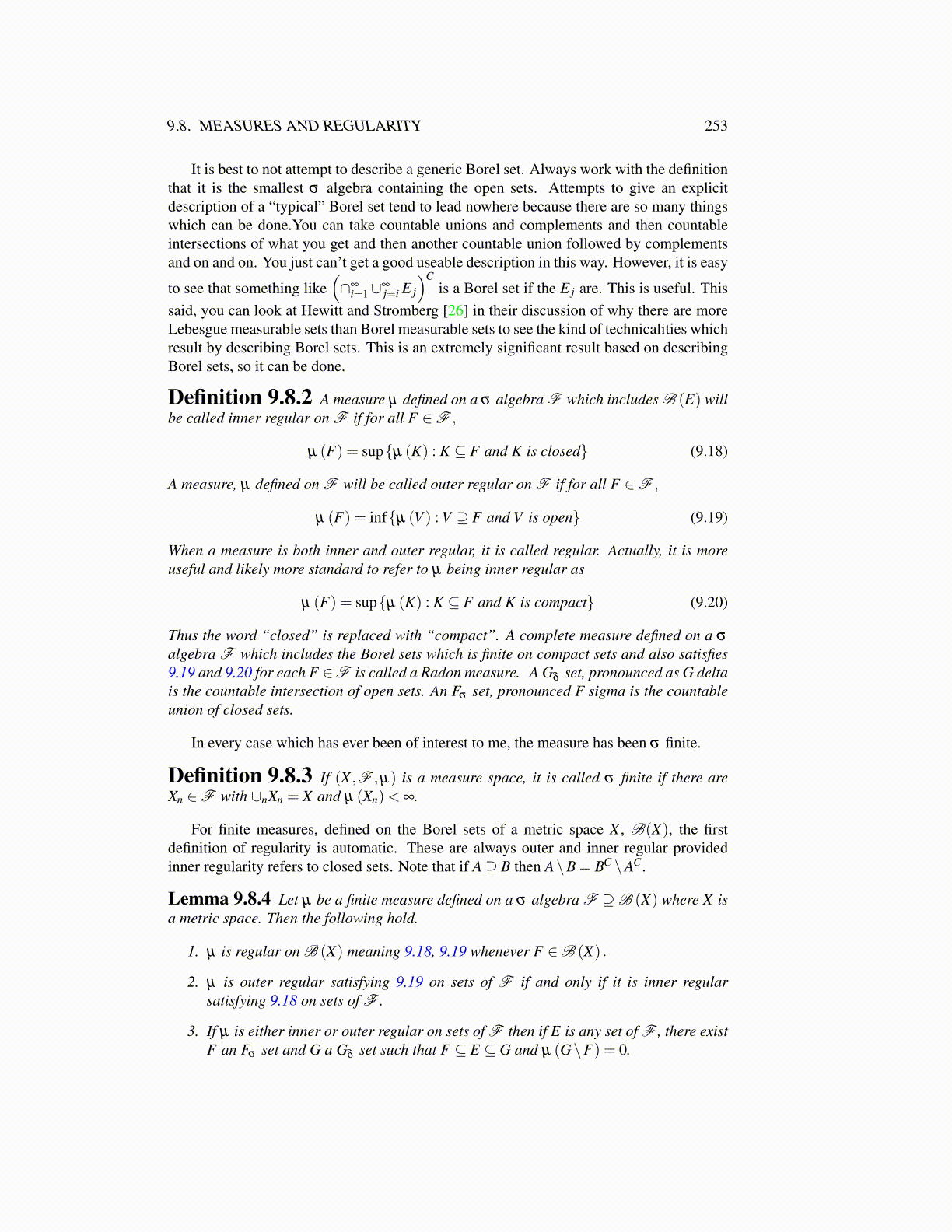
9.8. MEASURES AND REGULARITY 253
It is best to not attempt to describe a generic Borel set. Always work with the definitionthat it is the smallest σ algebra containing the open sets. Attempts to give an explicitdescription of a “typical” Borel set tend to lead nowhere because there are so many thingswhich can be done.You can take countable unions and complements and then countableintersections of what you get and then another countable union followed by complementsand on and on. You just can’t get a good useable description in this way. However, it is easy
to see that something like(∩∞
i=1∪∞j=i E j
)Cis a Borel set if the E j are. This is useful. This
said, you can look at Hewitt and Stromberg [26] in their discussion of why there are moreLebesgue measurable sets than Borel measurable sets to see the kind of technicalities whichresult by describing Borel sets. This is an extremely significant result based on describingBorel sets, so it can be done.
Definition 9.8.2 A measure µ defined on a σ algebra F which includes B (E) willbe called inner regular on F if for all F ∈F ,
µ (F) = sup{µ (K) : K ⊆ F and K is closed} (9.18)
A measure, µ defined on F will be called outer regular on F if for all F ∈F ,
µ (F) = inf{µ (V ) : V ⊇ F and V is open} (9.19)
When a measure is both inner and outer regular, it is called regular. Actually, it is moreuseful and likely more standard to refer to µ being inner regular as
µ (F) = sup{µ (K) : K ⊆ F and K is compact} (9.20)
Thus the word “closed” is replaced with “compact”. A complete measure defined on a σ
algebra F which includes the Borel sets which is finite on compact sets and also satisfies9.19 and 9.20 for each F ∈F is called a Radon measure. A Gδ set, pronounced as G deltais the countable intersection of open sets. An Fσ set, pronounced F sigma is the countableunion of closed sets.
In every case which has ever been of interest to me, the measure has been σ finite.
Definition 9.8.3 If (X ,F ,µ) is a measure space, it is called σ finite if there areXn ∈F with ∪nXn = X and µ (Xn)< ∞.
For finite measures, defined on the Borel sets of a metric space X , B(X), the firstdefinition of regularity is automatic. These are always outer and inner regular providedinner regularity refers to closed sets. Note that if A⊇ B then A\B = BC \AC.
Lemma 9.8.4 Let µ be a finite measure defined on a σ algebra F ⊇B (X) where X isa metric space. Then the following hold.
1. µ is regular on B (X) meaning 9.18, 9.19 whenever F ∈B (X) .
2. µ is outer regular satisfying 9.19 on sets of F if and only if it is inner regularsatisfying 9.18 on sets of F .
3. If µ is either inner or outer regular on sets of F then if E is any set of F , there existF an Fσ set and G a Gδ set such that F ⊆ E ⊆ G and µ (G\F) = 0.